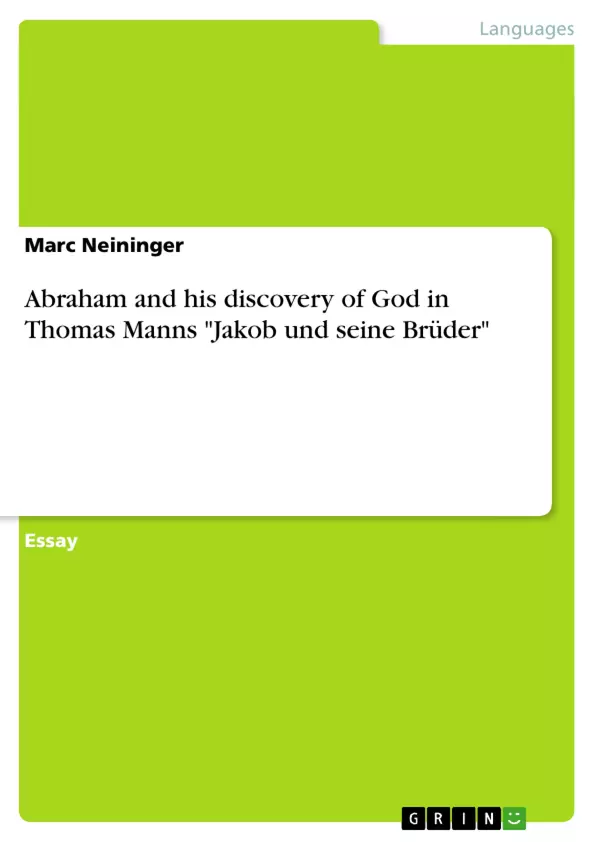In Thomas Mann’s Die Geschichten des Jakab, the first novel in the tetralogy Joseph und seine Brűder, Jakob is presented to us in quite a bewildering way. He is in god’s chosen linage. We expect such a character to be dignified, a leader, a man of merit and virtue. But Jakob is in most points the opposite of this. He steals the birthright and his father’s blessings from his older brother Esau. On the following flight he gets completely abased by the 16-year-old Eliphas, a son of Esau. During his time with Laban, he gains great wealth through trickery and finally he again flees while Laban is away. Also, within his family Jakob appears highly selective in his preferences. But not only he but also God is morally doubtful. He liked the sacrifice of Abel better than the one of Cain; then he almost destroys all life on earth with the flood. His treatment of Sodom and Gomorra is quite extreme and finally he chose one particular lineage as his favorite one. That linage starts with Abram. It is most peculiar, though, that Abram discovered God. Only because of this event Abram’s lineage is God’s chosen one. It is the actual discovery of God that constitutes Abram as the “Urvater”, since of course Abram had ancestors himself; therefore it is not Abram as a person himself who is decisive for his status. But as we will see later on, it is doubtful that Abram was actually one historic person.
Inhaltsverzeichnis (Table of Contents)
- Abraham, the “Urvater“ and his discovery of God
- Wie Abraham Gott entdeckte
- Der Herr des Boten
- Mondgrammatik
- Höllenfahrt
Zielsetzung und Themenschwerpunkte (Objectives and Key Themes)
This text explores the figure of Abraham in Thomas Mann's Die Geschichten des Jakab. It examines how Abraham's discovery of God is presented as a contemplative process, tracing his journey from a belief in earthly deities to a belief in a higher power. The text further investigates the relationship between Abraham and God, questioning whether God is a projection of Abraham's mind or a truly independent entity. The text also delves into the role of myth and history in shaping Abraham's narrative.
- Abraham's discovery of God as a contemplative process
- The relationship between Abraham and God
- The role of myth and history in shaping Abraham's narrative
- The importance of the "rollende Spähre" concept in understanding Abraham's double-existence
- The impact of Abraham's "Seelengrösse" on his relationship with God
Zusammenfassung der Kapitel (Chapter Summaries)
- Abraham, the “Urvater“ and his discovery of God: This chapter introduces the central figure of Abraham and his unique role as the "Urvater" in the narrative. It discusses how Abraham's discovery of God is presented as a decisive moment, shaping his lineage as God's chosen one. This chapter also raises questions about the historicity of Abraham's character.
- Wie Abraham Gott entdeckte: This chapter focuses on the process of Abraham's discovery of God. It details how Abraham, through a process of abstraction, progresses from simple empirical observations to a belief in a higher, causal factor. The chapter explores the connection between this discovery and human cultural development.
- Der Herr des Boten: This chapter explores the multiple myths associated with Abraham. It examines the role of Eliezer, Abraham's servant, in narrating these myths, and the ambiguity of the narrator's perspective. This chapter also introduces the concept of Abraham's "double-existence," being both a historical figure and a mythical figure.
- Mondgrammatik: This chapter further explores the mythical aspect of Abraham's narrative. It introduces the "rollende Spähre" concept, which sees the divine realm and the historical realm as intertwined. This chapter also highlights the institutionalized nature of both Abraham and Eliezer, representing a culmination of various narratives.
- Höllenfahrt: This chapter introduces the concept of ahistoricism in the narrative. It explores how the "days of Seth" provide a framework for understanding the world, where historical events and the divine realm are intertwined. This chapter reinforces the idea that history is not a linear progression but a cyclical process.
Schlüsselwörter (Keywords)
This text focuses on the themes of Abraham's discovery of God, the nature of myth and history, the relationship between individual consciousness and collective identity, and the influence of cultural and religious contexts on the development of belief systems. It explores key concepts such as the "rollende Spähre," Abraham's "Seelengrösse," and the nature of the "Urvater" in relation to God's chosen lineage.
Frequently Asked Questions
How is Abraham's discovery of God described in Thomas Mann's work?
It is presented as a contemplative process of abstraction, where Abraham moves from empirical observations of earthly deities to a belief in a higher, causal power.
What is the "rollende Sphäre" (rolling sphere) concept?
It is a concept used to understand Abraham's double-existence, where the divine realm and the historical realm are intertwined and cyclical.
Is Abraham considered a historical person in this analysis?
The text raises doubts about whether Abraham was a single historical person, suggesting he may be a culmination of various mythical and cultural narratives.
What role does Eliezer play in the narrative?
Eliezer is Abraham's servant and acts as a narrator of myths, contributing to the ambiguity between historical facts and mythical traditions.
How does the "Seelengrösse" (greatness of soul) affect Abraham's relationship with God?
The text investigates whether God is an independent entity or a projection of Abraham's own mind and "Seelengrösse."
- Arbeit zitieren
- Marc Neininger (Autor:in), 2004, Abraham and his discovery of God in Thomas Manns "Jakob und seine Brüder", München, GRIN Verlag, https://www.grin.com/document/39239



